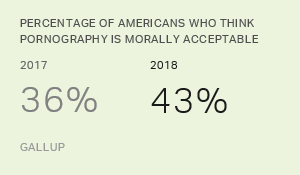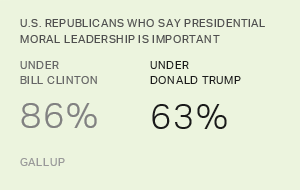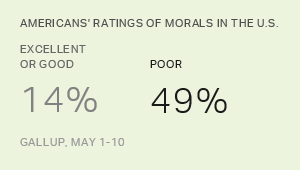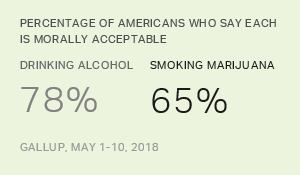Story Highlights
- Highest level since Gallup began asking about it in 2011
- Partisan differences on morality of pornography wider than ever
- Younger men, nonmarried more accepting of pornography
WASHINGTON, D.C. -- Forty-three percent of Americans now believe pornography is "morally acceptable," a seven-percentage-point increase from last year and the highest level since Gallup first began measuring moral perceptions of pornography in 2011.
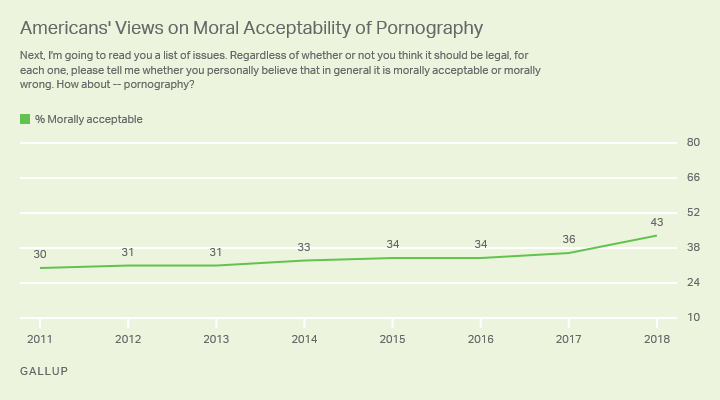
These results come from Gallup's annual Values and Beliefs survey, conducted May 1-10. Since it was first fielded in 2001, this survey has found considerable evidence that Americans are becoming increasingly liberal in terms of what actions or behaviors they find morally acceptable.
From 2011 onward, notable shifts in opinion are apparent for actions such as doctor-assisted suicide, gay/lesbian relations, sex between unmarried people and having a baby out of wedlock.
Until this year, though, Americans' perceptions regarding the morality of pornography have changed at a more modest rate than these other issues. From 2011 to 2017, the percentage of Americans who find pornography morally acceptable rose by six points, whereas Americans' opinions on those other issues changed by an average of nine points.
But in light of this year's seven-point shift, perceptions that pornography is morally acceptable have increased more than any of the 16 other behaviors or practices Gallup has measured over the time span of 2011-2018.
Acceptance of Pornography Spikes Among Democrats
For the first time on record, a majority of Democrats (53%) say pornography is morally acceptable. Last year, this figure stood at 42%. Democrats' acceptance of pornography has grown by 21 points since 2011.
The 27% of Republicans who regard pornography as morally acceptable is generally stable this year compared with last year's 25%. However, Republicans have become somewhat more accepting of pornography since 2011, with the percentage "morally acceptable" rising by 11 points.
Forty-five percent of independents say this year that pornography is morally acceptable, a five-point increase from last year. Overall, independents' views on the morality of pornography have been relatively stable since 2011.
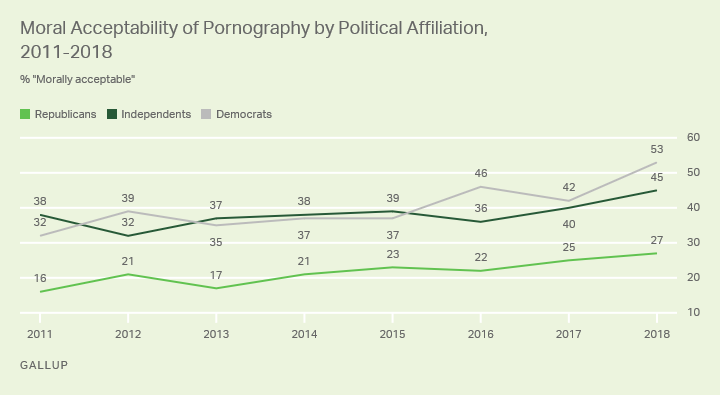
The partisan gap on the morality of pornography widened slightly this year (to 26 points), largely because of the sizable change in Democratic attitudes. Why Democrats' attitudes shifted is less clear. While Democrats have become increasingly socially liberal, the percentage of Democrats who describe themselves as socially liberal this year is essentially unchanged from the year before.
Another explanation is that Stormy Daniels, adult film star actress and fierce critic of President Donald Trump, has given pornography a sense of moral credibility that it previously lacked.
Views on Pornography Since 2017 Change Most Among Younger Men and Those Not Married
Compared with a number of demographic traits or characteristics that help shape a person's moral perceptions of pornography -- including gender, age, importance of religion in one's life and marital status -- two subgroups saw a big year-over-year spike in the their acceptance of pornography. These are nonmarried individuals and men aged 18 to 49.
This year, the percentage of nonmarried individuals who find pornography morally acceptable rose 15 points to 50%. Acceptance of pornography among married individuals, at 35% this year, is essentially no different from last year's 37%.
Meanwhile, 67% of men aged 18 to 49 this year say pornography is morally acceptable, a 14-point increase from last year. By contrast, perceptions remained relatively stable across other age-gender categories, including men who are 50 or older (a one-point increase), women aged 18 to 49 (+4 points) and women aged 50 and older (+7 points).
Religion also plays an important role in how a person perceives the morality of pornography, with 22% of those for whom religion is "very important" saying pornography is morally acceptable this year, compared with about three-quarters of those who say religion is "not very important."
| 2017 | 2018 | Change | |||||||||||||||||||||||||||||||||||||||||||||||||||||||||||||||||||||||||||||||||||||||||||||||||
|---|---|---|---|---|---|---|---|---|---|---|---|---|---|---|---|---|---|---|---|---|---|---|---|---|---|---|---|---|---|---|---|---|---|---|---|---|---|---|---|---|---|---|---|---|---|---|---|---|---|---|---|---|---|---|---|---|---|---|---|---|---|---|---|---|---|---|---|---|---|---|---|---|---|---|---|---|---|---|---|---|---|---|---|---|---|---|---|---|---|---|---|---|---|---|---|---|---|---|---|
| % | % | (pct. pts.) | |||||||||||||||||||||||||||||||||||||||||||||||||||||||||||||||||||||||||||||||||||||||||||||||||
| Not married | 35 | 50 | +15 | ||||||||||||||||||||||||||||||||||||||||||||||||||||||||||||||||||||||||||||||||||||||||||||||||
| Married | 37 | 35 | -2 | ||||||||||||||||||||||||||||||||||||||||||||||||||||||||||||||||||||||||||||||||||||||||||||||||
| Male, 18 to 49 | 53 | 67 | +14 | ||||||||||||||||||||||||||||||||||||||||||||||||||||||||||||||||||||||||||||||||||||||||||||||||
| Male, 50+ | 35 | 36 | +1 | ||||||||||||||||||||||||||||||||||||||||||||||||||||||||||||||||||||||||||||||||||||||||||||||||
| Female, 18 to 49 | 37 | 41 | +4 | ||||||||||||||||||||||||||||||||||||||||||||||||||||||||||||||||||||||||||||||||||||||||||||||||
| Female, 50+ | 16 | 23 | +7 | ||||||||||||||||||||||||||||||||||||||||||||||||||||||||||||||||||||||||||||||||||||||||||||||||
| 18 to 34 | 48 | 59 | +11 | ||||||||||||||||||||||||||||||||||||||||||||||||||||||||||||||||||||||||||||||||||||||||||||||||
| 35 to 54 | 40 | 47 | +7 | ||||||||||||||||||||||||||||||||||||||||||||||||||||||||||||||||||||||||||||||||||||||||||||||||
| 55+ | 22 | 27 | +5 | ||||||||||||||||||||||||||||||||||||||||||||||||||||||||||||||||||||||||||||||||||||||||||||||||
| Male | 45 | 53 | +8 | ||||||||||||||||||||||||||||||||||||||||||||||||||||||||||||||||||||||||||||||||||||||||||||||||
| Female | 27 | 32 | +5 | ||||||||||||||||||||||||||||||||||||||||||||||||||||||||||||||||||||||||||||||||||||||||||||||||
| Religion is very important | 16 | 22 | +6 | ||||||||||||||||||||||||||||||||||||||||||||||||||||||||||||||||||||||||||||||||||||||||||||||||
| Religion is fairly important | 42 | 50 | +8 | ||||||||||||||||||||||||||||||||||||||||||||||||||||||||||||||||||||||||||||||||||||||||||||||||
| Religion is not very important | 70 | 76 | +6 | ||||||||||||||||||||||||||||||||||||||||||||||||||||||||||||||||||||||||||||||||||||||||||||||||
| Gallup | |||||||||||||||||||||||||||||||||||||||||||||||||||||||||||||||||||||||||||||||||||||||||||||||||||
Implications
Americans' views regarding the moral acceptability of pornography, which remained relatively stable for much of this decade, rose significantly this year. Why moral perceptions of pornography changed so dramatically this year is difficult to assess, but the larger trend is easier to understand.
Across a number of issues related to sexuality and sex, Americans have -- at either a gradual or a quick rate -- been adopting a more permissive viewpoint, including such behaviors as sex between unmarried people and gay/lesbian relations. Even behaviors that most Americans still consider beyond the pale, such as polygamy, have seen a notable increase in acceptability. In this context, it is hardly surprising that a similar change would be observed with respect to perceptions of pornography.
The cause of the single-year shift on this item, though, is less clear. It may represent something of an outlier, in which case acceptance of pornography would be expected to decrease next year, even if it remains above the 2017 level. Or the shift, though principally driven by a structural trend, may been have been exacerbated by political factors, such as the public battle between Stormy Daniels and the president.
Survey Methods
Results for this Gallup poll are based on telephone interviews conducted May 1-10, 2018, with a random sample of 1,024 adults, aged 18 and older, living in all 50 U.S. states and the District of Columbia. For results based on the total sample of national adults, the margin of sampling error is ±4 percentage points at the 95% confidence level.
Each sample of national adults includes a minimum quota of 70% cellphone respondents and 30% landline respondents, with additional minimum quotas by time zone within region. Landline and cellular telephone numbers are selected using random-digit-dial methods.
Learn more about how the Gallup Poll Social Series works.
